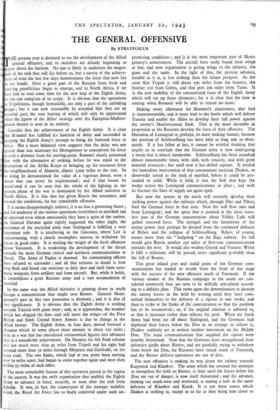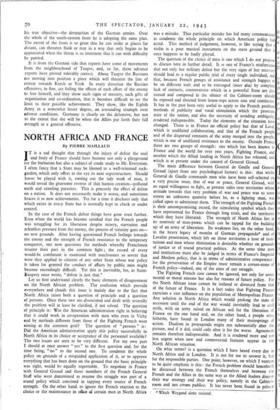THE GENERAL OFFENSIVE
By STRATEG1CUS
Consider first the achievement of the Eighth Army. It is clear that Rommel has fulfilled his function of delay and succeeded in escaping the Eighth Army's attempt to bring his battered force to batt.e. But a more balanced view suggests that the delay was not greater than was necessary for Montgomery to concentrate his force at such a distance from his starting-point. Rommel clearly presented him with the alternative of striking before he was equal to the destruct:on of the Afrika Korps or bringing up his resources from the neighbourhood of Alamein, almost t,000 miles to the east. In so doing he demonstrated the value of a vigorous threat, even a threat that can never be implemented ; and if that lesson be assimiated it can be seen that the whole of the fighting in the present phase of the war is dominated by the Allied initiative in North Africa. It is this that has given Russia the assurance, and created the conditions, for her remarkable offensive.
If it seems disappointingly indirect, it is no less a governing factor ;
r and the tendency of the various operations everywhere to interlock can be observed even where emotionally they have a spice of the useless.
t As General Dietmar quite rightly suggested the other night, the resistance of the encircled army near Stalingrad is fulfilling a very important role. It is interfering in the Caucasus, where List is endeavouring, with a clearly incomplete success, to withdraw his is forces in good order. It is stealing the weight of the fresh offensive below Voronezh. It is weakening the development of the thrust towards the main German central and northern communications at Nevel. The Army of Paulus is doomed. Its commanding officers have refused to surrender ; and all that remains in doubt is how long flesh and blood can continue to defy shot and shell from auto- matic weapons, from artillery and from aircraft. But, while it holds, it immobilises a great Russian army and a vast accumulation of material.
In the same way the Allied initiative is pinning down in south Europe a concentration that might save Rostov. General Mont-
gomery's part in this vast panorama is dramatic ; and it is also of vast significance. It is obvious that the Eighth Army is striding
towards Tunisia with giant steps ; and, as it approaches, the weather
which has clogged the feet—and still more the wings—of the First British and Sixth United States Armies is due to change in the Allied favour. The Eighth Army, in four days, moved forward a distance which in some places must amount to about 120 miles ; even in a war that has introduced astronomical figures into advances that is a remarkable achievement. On Monday his left flank column was not much more than 45 miles from Tripoli and his right had covered more than 5o miles through Misurata and Garibaldi, on the coast road. The two flanks, which had at one point been moving over 70 miles apart, had begun to come together again and were then within 55 miles of each other.
The most remarkable feature of this operation passed in the region of the unseen. It was the swift organisation that enabled the Eighth Army to advance in force, securely, so soon after the trek from Agheila. It was,.in fact, the counterpart of the strategic mobility wliich the Royal Air Force has so finely contrived under such un-
promising conditions ; and it is the most important part of Mont- gomery's achievement. The aircraft have really found their wings at last, and now organisation is giving wings to the infantry, the guns and the tanks. In the light of this, the present advance, notable as it is, is less striking than the future prospect. As the crow flies Tripoli is still about too miles from the frontier, the frontier Ito from Gabes, and that port zoo miles from Tunis. It is the new mobility of the concentrated force of the Eighth Army which will eat up those distances ; for it is clear that the time is coming when Rommel will be able to retreat no more.
Making every allowance for Rommel's elusiveness, that fact is incontrovertible, and it must lead to the battle which will deliver Tunisia and enable the Allies to develop their full power against the enemy's Mediterranean flank. This is the more desirable in proportion as the Russians develop the force of their offensive. The liberation of Leningrad is, perhaps, its most striking feature, because the position of Schliisselburg has been held so long and so obsti- nately. If it has fallen at last, it cannot be wishful thinking that impels us to conclude that the German army is now undergoing a strain that is almost intolerable. Schliisselburg has been assaulted almost innumerable times, with skill, with tenacity, and with great material resources ; but until now it has defied capture. It needed theimmediate intervention of that consummate tactician Zhukov, so deservedly raised to the rank of marshal, before it could be per- suaded to yield. While it held, it was the bolt that kept the wedge across the Leningrad communications in place ; and with its fracture the lines of supply are again open.
But now the armies in the north will certainly develop their striking power against the railways which, through Dno and Pskov, feed the German force in that area. New life will flow into and from Leningrad ; and the spear that is pointed at the most sensi- tive part of the German concentration about Velikic Luki will gather renewed force. The strength and the limitations of the enemy power may perhaps be divined from the continued defiance of Rzhev and the collapse of SchlOsselburg. Rzhev, of course, means more than the " hedgehog " on the Riga railway. Its fall would give Russia another 25o miles of first-rate communications towards the west. It would also weaken Ghatsk and Vyasma. When it falls a milestone will be passed, more significant probably than the fall of Rostov.
This great inland port and nodal point of the German com- munications has tended to recede from the front of the stage with the success of the new offensive south of Voronezh. If the various strokes of the Russian campaign in the south are con- sidered attentively they are seen to be skilfully articulated accord- ing to a definite plan. This turns upon the determination to destroy the enemy forces in the field by waiting until they have com- mitted themselves to the delivery of a riposte to one stroke, and then to strike at the flanks of the concentration so that the problem has to be reconceived ; or, if the original solution is adhered to, so that it increases rather than relieves the peril. When the Sixth Army had been cut off about Stalingrad, and the Germans had deployed their forces below the Don in an attempt to relieve it, Zhukov suddenly set in motion another movement on the Middle Don. The main communications that supplied the riposte were thereby threatened. Now that the Germans have strengthened their defensive girdle about Rostov, and are painfully trying to withdraw from below the Don, the Russians have struck south of Voronezh, and the Rostov defence operations are out of date.
The new offensive is making its way down the railway towards Kupyansk and Kharkov. The army which has covered the attempts to strengthen the hold on Rostov, at least until the forces below the Don are out of danger, is now itself threatened ; and the advance, fanning out south-west and westward, is tearing a hole in the outer defences of Kharkov and Kursk. It is not these towns which Zhukov is striking at, except in so far as they bring him closer to his true objective—the destruction of the German armies. Over the whole of the south-eastern front he is adopting the same plan. The extent of the front is so great that he can strike at places far distant, can threaten flank or rear in a way that only begins to be appreciated when the threat is so imminent that it can with difficulty be parried.
It is from the German side that reports have come of movements from the neighbourhood of Tuapse, and, so far, these advance reports have proved tolerably correct. About Tuapse the Russians are moving into position a piece which will threaten the line of retreat towards Kerch or Yeisk In every direction the Russian offensives, in fine, are foiling the effects of each effort of the enemy to free himself, and they show such signs of mastery, such gifts of organisation and co-ordination, that it becomes difficult to set the limit to their possible achievement. They show, like the Eighth Army in a somewhat lesser degree, an astounding triumph over adverse conditions. Germany is clearly on the defensive, but not to the extent that she will be when the Allies put forth their full strength in a general offensive.



























 Previous page
Previous page